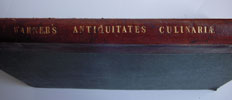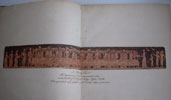Antiquitates Culinariae;
or Curious Tracts relating to the Culinary affairs of the Old English, With a preliminary discourse, Notes, and Illustrations, By The Reverend Richard Warner, of Sway, near Lymington, Hants. Printed for R. Blamire Strand, London, 1791.
FIRST & SOLE EDITION. Large 4to. 1feps with a tipped in hand written letter from Richard Warner. [1] Frontispiece - an aquatint plate of 'A Saxon Entertainment' Engraved title-page. [2] 1 double-paged aquatint plate of the famous 'Peacock Feast'. (1)ii-lvii Preliminary Discourse. [1] (1)-l The Contents. [1]2-137. [1]1fep. Occasional very minor spotting, else a very well-preserved wide-margined large paper copy. Rare original cloth boards and leather spine with gilt lettering. Both ends of the spine slightly rubbed and a crack on one side but still solid. The tipped in 1p hand written letter from the Rev.Richard Warner to 'Mr Dear Sir' asking for a facsimile "of the words per me Ric. Abbem at the foot of the acknowledgement of supremecy of Hen: VIII." 110x160mm with very minor blemishes just above the signature. Dated 14th August 1825 - Weston super Mare, Somerset.
- Richard Warner (1763–1857), divine and antiquary, born in Marylebone, London, on 18 Oct. 1763, was the son of Richard Warner, ‘a respectable London tradesman.’ Early in his sixth year he was sent to a boarding-school near London, and remained there until his father removed, with his family, to Lymington in Hampshire, described by him in his ‘Literary Recollections’. On 19 Oct. 1787 he matriculated from St. Mary Hall, Oxford, and kept eight terms at the university, but left without taking a degree. About 1790 Warner was ordained by William Markham, archbishop of York, his title being the curacy of Wales, near Rotherham, where he stayed for three months, the curacy of his vicarage of Boldre, near Lymington for nearly four years. The influence of Gilpin's tastes was afterwards perceptible in the topographical writings of Warner. Then the more lucrative curacy of Fawle for over two years; but the situation did not agree with his family. The chapel of All Saints, Bath, in the parish of Walcot, was opened for divine service on 26 Oct. 1794, and Warner was placed in charge of it as curate to John Sibley, rector of the mother parish. In April 1795 he accepted the curacy of the populous parish of St. James's, Bath, and he continued in that position for about twenty-two years, preaching his farewell sermon on 23 March 1817. For many years after his settlement at Bath, Warner was the best-known man of letters in that city, and he knew all the literary men who frequented it. Warner was appointed on 13 May 1809 to the rectory of Great Chalfield in Wiltshire, which he enjoyed until his death. In the 1826 list of fellows of the Society of Antiquaries his name appears as elected, but he was never admitted. He died on 27 July 1857, when nearly ninety-four years of age, and was buried on 11 Aug. 1857 in the chancel of Chelwood church, a monument being erected to his memory. The widow, Anne [‘Pearson’], died at Widcombe Cottage, Bath, on 23 March 1865, aged 85, and was buried at Chelwood. One daughter, Ellen Rebecca Warner, was also buried there on 18 Sept. 1833. Warner's voluminous writings comprised over 44 various volumes. Given this huge output, one wonders if the people of his many parishes knew what he looked like. This, his infamous book, ‘Antiquitates Culinariæ: Tracts on Culinary Affairs of the Old English,’ 1791 attracted the attention and ire of John Carter (1748–1817) who prosecuted him for pirating in this work his print of the ‘Peacock Feast,’ and got a verdict for 20l guineas. The print was therefore torn from all the copies then unsold. This action cost Warner 70l guineas in all. Interestingly, Warner had been told that Carter had given permission for the reproduction. This fine original copy has survived with the ‘Peacock Feast’ plate intact.





click on image to enlarge

Antiquarian category
ref number:
11056